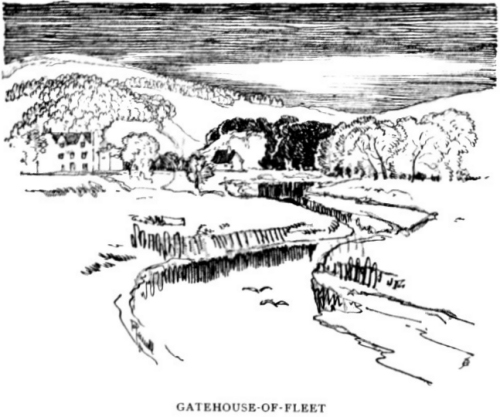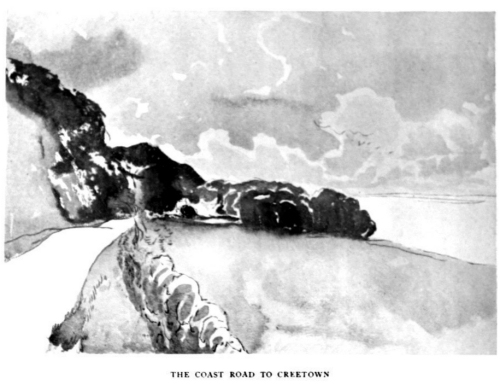|

THE KIRK KNOWE OF BALMAGHIE
BUT such sights have long been strange to the valley of the
Dee. It is now rich with trees, pasture lands, waving crops, with here and
there, peeping out, the mansions of the great. Cairnsmuir and Ben Gairn
stand out south and north like blue broad-shouldered sentinels. But Castle
Thrieve, tall and stark among its water meadows, though massive as of yore,
is now only four walls of crumbling stone, and the Maid's bridal chamber but
a ruin wherein the clamorous jackdaw may build his nest.
Leaving Glenlochar and Knockcannon on the right there is a
beautiful woodland mile, passing that awkward double turn of road by
Balmaghie High Lodge, the dangers of which suggested the chapter called "The
Green Dook" in "The Banner of Blue." ‘The old house of the M'Ghies of
Balmaghie (often referred to in " Lochinvar" 2) has now no
existence in fact. Its place has been taken by a quite modern mansion-house.
The woodlands have been extended, and there is every reason for believing
that in the seventeenth century the rough, characteristically Galloway
moorland country about Glentoo and the Creochs ran almost to the doors of
the house itself.
Strangely enough, the Kirk of Balmaghie is situated on the
very edge of the parish, most inconveniently for pastoral work, though to
the advantage of the minister's quiet when preparing his sermon. All who
would know more of the truth about Balmaghie Kirk must get Professor Reid's
very excellent little book, "The Kirk above Dee Water." It tells of the
Kirk, its ministers, of the martyrs also, and the many saintly folk who lie
buried in that solitude.
The life of Macmillan, its famous minister, has been for
the first time worthily written by Dr. Reid. "The Cameronian Apostle" cannot
be recommended too often or too highly. It is, in my humble opinion, one of
the most successful pieces of sympathetic biography ever written. And having
made an attempt of the same kind in fiction, I know of what I do speak. I
will return to plunder Dr. Reid's book presently. Meantime I give the words
of Macmillan as they were imagined with regard to his parish.
"Balmaghie was a parish greatly to my mind (so he is
represented as writing). It lies, as every one knows, in the very heart of
Galloway, between the slow, placid, sylvan stretches of the Ken and the
roaring, turbulent mill-race of the Black Water of Dee.
“From a worldly point of view the parish is most desirable;
for though the income in money and grain is not great, nevertheless the
whole amount is equal to the income of most of the smaller lairds in the
neighbourhood. So at last I was settled in my parish, which was indeed a
good and desirable one as times went. The manse had recently been put in
order. It was a
1 Hodder & Stoughton. 2 Methuen.
pleasant stone house, which sat in the bieldy hollow beneath
the Kirk Knowe of Balmaghie. Snug and sheltered it lay, an encampment of
great beeches sheltering it from the northerly blasts, and the green-bosomed
hills looking down upon it with kindly tolerant silence.
The Broad
Dee Water.
“The broad Dee Water floated silently by, murmuring a
little aCter the rains; mostly silently, however-the water lapping against
the reeds and fretting the low
cavernous banks when the wind blew hard, but on the
whole slipping past me with a certain large peace and attentive stateliness.
“The kirk of Crossmichael sits, like that of Balmaghie, on
a little green hill above Dee Water. One house of prayer fronts the other,
and the white kirk yard stones greet each other across the river, telling
one common story of earth to earth. And every Sabbath day across the
sluggish stream two songs of praise go up to heaven in united aspiration
towards one Eternal Father."
"The Sabbath came–a day of infinite stillness, so that from
beside the tombs of the martyr Hallidays in the kirkyard of Balmaghie you
could hear the sheep bleating on the hills of Crossmichael a full mile away,
the sound breaking mellow and fine upon the ear over the broad and azure
river.
"To me it was like the calm of the New Jerusalem. And,
indeed, no place that ever I have seen can be so blessedly quiet as the
bonny kirk-knowe of Balmaghie, mirrored on a windless day in the encircling
stillness of the Water of Dee.
“So, the service being ended for the day, I walked quietly
over to the farm-town of Drumglass. There I found a house well furnished,
oxen and kine knee-deep in the rich grass of water-meadows, hill pastures,
crofts of oat and bear in the hollows about the door, and over all such an
air of bien and hospitable comfort that the place fairly beckoned me to
abide there.” 1
1 “The Standard-Bearer," pp. 102, 141, 217, 231, 318.
(Methuen.)

But the minister of Balmaghie had doubtless more bitter
memories of the manse and the kirk–as when, on the night of his expulsion,
he looked across at the lighted windows of Crossmichael Kirk, in which his
adversaries had assembled to make an end of him.
"Yet more grimly bitter than the day of December the 30th,
fell the night thereof. I wandered by the bank of the river, where the
sedges rustled lonely and dry by the marge, whispering and chuckling to each
other because a forlorn, broken man was passing by. A ‘smurr ' of rain had
begun to fall at the hour of dusk, and the slight ice of the morning and
long since broken up. The water lisped and sobbed as the wind of winter
lapped at the ripples, and the brown peat-brew of the hills took its
sluggish way to the sea.
“Over against me, set on its hill, I saw the lighted
windows of the kirk of Crossmichael. Well I knew what that meant. Mine
enemies were sitting there in conclave. They would not rise till I was no
more minister of the Kirk of Scotland."
Yet such was the temper of the Balmaghie folk that Macmillan
held kirk and manse so long as it pleased him to remain.
From another place I have extracted a morning scene in the
little kirkyard, a description which does not give its ordinary every-day
impression, but rather one of the rarer moods in which the sense of the
Unseen takes hold of us–yet perhaps a picture not less faithful on that
account.
“The little kirk of Balmaghie, is, as I have already
mentioned, set on a hill, and from where I stood its roof and low tower were
clear-cut against the crimson dawn. So red it was that, by contrast, the
very tombstones took on a kind of unearthly green, as the shadowing trees
waved their dead leaves, or, shaking them off, sent them balancing down. So
that with the flaming light above and pale efflorescence beneath, it seemed
as if the spirits of the dead went wavering upwards from their tombs,
gibbering with filmy hands and moaning as they went.
A Mood of Morning.
"There are, indeed, moods of morning far more terrible than
those of the blankest midnight–perhaps premonitory of the shuddering rigours
which shall take us when the pall of the future is removed and That Day
shall dawn upon us-–emote, awful, gIimmering with the infiniteness and
possibilities that are only revealed to us in moments of mortal sickness.
"As I thus watched the dawn and my soul was disturbed
within me, my feet turned of their own accord in the direction of the little
hill-set kirk of Balmaghie. I turned about its eastern side that I might
find the gravestones of the two martyr Hallidays, of which the mistress of
the manse had told me the night before.
"By this time the red colour in the sky had mounted to the
zenith. The sun was transmuting the lower cloud-bars to fantastic islands of
purest gold. The whole pageant of the dawn stood on tiptoe, and then, all at
once calming my harassed and fearful soul, I was a ware of the broad Dee
Water slipping along, a sea of glass mingled with fire, as it seemed,
straight from the throne of God itself."1
To some among us Balmaghie Church appeals more nearly
still. Dear dust lies in that kirkyard, and as the years pass by, for many
of us, more and more of it gathers under the kirk on the hill. The tides of
the world, its compulsions, its needs, and its must be's, lead me up the
loaning but seldom. Indeed I am not often there, save when the beat of the
passing bell calls another to the long quiet rest.
But when the years are over, many or few, and our Galloway
requiem, "Sae he's won awa'," is said of me–that is the bell I should like
rung. And there, in the high corner, I should like to lie, if so the fates
allot it, among the dear and simple folk I knew and loved in youth. Let them
lay me not far from the martyrs, where one can hear the birds crying in the
minister's lilac-bushes, and Dee kissing the river grasses, as he lingers a
little wistfully about the bonny green kirk-knowe of Balmaghie.
1 “The Dark o' the Moon," p. 140. (Macmillan & Co.)
|

